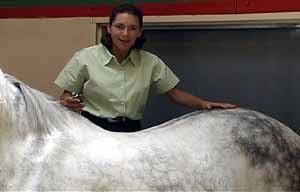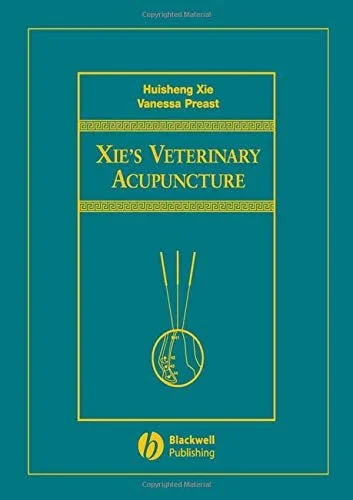Equine Acupuncture
Photo by Jon Tyson on unsplash
As veterinarian Heather Mack approaches cutting horse Gold Mount her examination begins like any other. She checks the gelding for cuts or bruises, inspects his teeth and gums, and checks out his hooves. But when she starts sticking needles into the 15-year-old horse's hide, something different is clearly afoot.
"There are meridians, or streams of energy, that flow from our ears to our toes. The Chinese call this life energy the 'chi,' or life force," Heather explains. "If the chi is out of balance, then disease sets in."
Gold Mount stands quietly, never flinching as Heather taps needles into place. Ten minutes into the acupuncture treatment his hide is littered with about two dozen of the blue-capped needles. One tall needle on the horse's flanks is capped with a smoldering wad of a Chinese herb, moxa, that releases a faintly medicinal incense.
"One place where this horse is giving me a lot of reaction is up here," Heather points out, her fingers poised over a spot on the spine near Gold Mount's flank. When she presses on the spot he flinches.
"That goes to the hocks, the hind leg," she explains. "Here he's showing me that maybe his hocks hurt him. Any spot where he's giving me an indication that he's got trouble, I'll needle it and it should relieve the pain in many places on his body."
The 15-year-old veteran of cutting horse competitions has a chronic hock problem that some veterinarians would treat with an injection of steroids to relieve the pain. Heather, on the other hand, never touches the sore joint directly. Instead, she sticks needles in an energy meridian on the horse's back which flows to the hock, believing that by indirectly calling attention to the sore spot the animal's own body energy will do the healing
Heather is one of a growing number of equine acupuncturists practicing their trade in America. Licensed to practice veterinary medicine by the State of Idaho and to practice animal acupuncture by the International Veterinary Acupuncture Society, she is a rare breed, combining Eastern approaches to healing with her Western training. She is an associate at the Bald Mountain Veterinary Clinic in Hailey.
"Back in Chester County, Pennsylvania, where there's farm after farm of expensive and beautiful sport horses, there would be a regular vet to come in and do worming and floating teeth, and they would call me in to just to do my specialty," she explained.
The practice of acupuncture is founded on a knowledge of energy flows, or chi. Where there is tension and blockage in the flow, pain and illness erupt. Like a 911 call to the body's internal EMTs, "needling" is done to stimulate a specific energy meridien and bring forth a curative life force.
"There's also a definite neuro-chemical basis for the analgesic effects of acupuncture," Heather explains. "The needles stimulate small nerve endings that hit larger motor neurons which go to the spinal cord and up to several different areas in the brain. There's a measurable amount of indigenous endorphins released when animals or humans are needled."
In other words, natural drugs are released in the brain that cloud the pain. Needling makes the animal high.
Heather discovered acupuncture while attending Columbia University in New York. Plagued by stress and poor health, her hair was falling out. Thousands of dollars in medical treatments and consultations with skin specialists failed to solve the problem.
"Finally, I went to a human acupuncturist, Kenny Gon in Little Italy, and he turned me right around. He gave me herbs and he needled me for my problems and everything cleared up," she recalls.
Fascinated with Kenny's skills, Heather apprenticed herself to him for several months, learning how to needle people, dogs, and then horses. "I took him out to a farm in New Jersey where a friend had some show horses and he
needled them. And I knew right then that it was something I wanted to learn to do," she says.
After graduating from Columbia University, Heather was accepted into the prestigious School of Veterinary Medicine at the University of Pennsylvania. There she was schooled in the latest in Western science on doctoring animals, from diagnosing illnesses and prescribing drugs to nursing wounds and performing surgeries.
At the same time, Heather met two important mentors -- Dr. Ed Schaeffer, a veterinarian practicing homeopathic medicine on Amish farm animals in Pennsylvania, and Meredith Snader, an equine acupuncturist. Their influence affected her approach to veterinary practice.
"While at vet school I was always considering the alternatives. I'd go home at night and think 'I could have done this, I could have done that.' I was constantly considering the alternatives to chemotherapy or steroids. There was a saying in vet school: 'No dog will die without steroids.' They are an immediate sort of bandaid approach to a problem, but they are very detrimental in the long run. Steroids will completely wipe out the immune system," she pointed out.
In her own practice, first in Vermont and now in Idaho, Heather favors the use of non-synthetic herbal medicines in treatements for arthritis, inflammations, lameness, and even epilepsy. And for physical examinations she will often use acupuncture, with and without needles, to find and clear energy blockages in the animal's nervous system.
Herbal remedies can be used to solve a host of ailments, Heather explains. Her travel kit contains dozens of vials of homeopathic potions and mixtures. Some are as commonplace as vinegar, which can help deter insects when added to a horse's drinking water. The vinegar changes the composition of the animal's sweat, making it repellant to many insects.
Heather also carries, and is certified to use, conventional veterinary medicines like antibiotics and pain-killing drugs. They, too, have a place in her practice.
"If a dog were hit by a car I wouldn't burn moxa on him. If he had open wounds and his liver were sticking out, I'd sew him up, put him on lots of fluids and I'd probably put him on antibiotics," she explains.
"But as soon as possible I would get him off those things and start using some homeopathic salves. For his skin wounds I would probably make a poultice using mullen and comfrey and things of that sort."
Acupuncture and homeopathic medicines have their limits, she acknowledges. Heather recently discovered a fatty tumor on one of the cutting horses she was treating and scheduled it for surgery.
"I couldn't have dissipated that with homeopathic medicines. It needed to be taken out."
Eastern and Western approaches to veterinary medicine can work hand-in-hand, she insists. "If a horse has a big laceration, I'm not going to meditate over it. I'm going to sew it up. But I might give the animal a homeopathic remedy for the trauma that its had. And I might very well wrap its wound in a homeopathic ointment instead of injecting the animal with penicillin.
"Most vets would just shoot 'em with penicillin twice a day, no doubt about it. And there have been times when I've been burned because I didn't do that and the wound got infected. But I'm interested in trying the non-invasive approaches first."
Acupuncture can be applied to all kinds of pets and livestock. Heather has even used the treatment to cure prolapses in cows. But it is with horses that the horsewoman from Bear Creek, Pennsylvania prefers to work.
"I definitely feel that my gift is with horses," she says.



